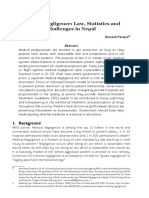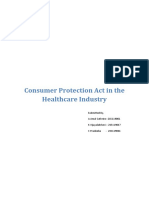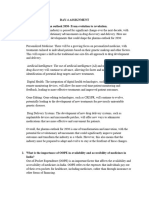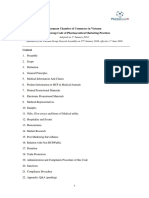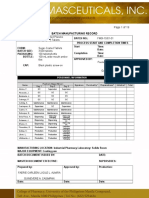MLSI Letter To PMO Press Release 230818 085333
MLSI Letter To PMO Press Release 230818 085333
Uploaded by
Amit Kumar GuptaCopyright:
Available Formats
MLSI Letter To PMO Press Release 230818 085333
MLSI Letter To PMO Press Release 230818 085333
Uploaded by
Amit Kumar GuptaOriginal Description:
Original Title
Copyright
Available Formats
Share this document
Did you find this document useful?
Is this content inappropriate?
Copyright:
Available Formats
MLSI Letter To PMO Press Release 230818 085333
MLSI Letter To PMO Press Release 230818 085333
Uploaded by
Amit Kumar GuptaCopyright:
Available Formats
1.
Fundamental rights of the patients violated :
a. Right of being Represented in a Court by a lawyer is a
Fundamental Right under Article 21 of the Constitution
b. Right to appeal : It is a fundamental component of the Indian
legal system and is intended to ensure equitable and
impartial administration of justice
c. Right to health : Refusal of treatment for non-payment of fees
permitted to the healthcare professionals and institutions is
ambiguous as what is emergency for patients may not be
emergency for doctors and hence may lead to violence or be
challenged as violative of Right to Health under article 21.
Law commission report 201 recommends Scheme for
reimbursement to hospitals and medical practitioners,
ambulance for transfer, etc., to be framed by State
Governments, States to allocate Funds which has not been
implemented by any State Government.
2. Fundamental rights of medical professionals violated :
a. Right of being Represented in a Court by a lawyer is a
Fundamental Right under Article 21 of the Constitution
b. Right to profession 19(1)g : Medical profession considered
under consumer protection Act, but right to profession is
withdrawn as advertisement is prohibited
c. Contradictory legal provisions : NMC imposes confidentiality
of medical information at the same time NMC imposes
responsibility for digitization of medical records (which are
likely to be leaked to third parties). NMC regulations impose
legal obligation and Ayushman Bharat Digital Mission
imposes financial burden for following the regulations. By not
following NMC regulations RMP has legal liability and by
violating the Digital Personal Data Protection (DPDP) Bill
there will be a huge financial burden. Both these
contradictory provisions are without offering any protection
from action for leak of data as RMP will be considered data
fiduciary instead of data collectors.
3. Right to life of patient protected while not protecting
right to life of the doctors : In case of emergency (life and
limb saving procedure) an RMP shall provide first aid and
other services to the patient according to his expertise and the
available resources before referral. While this protects the
right of the patient, there is no corresponding duty imposed
on the patient not to indulge into violence. This is violative of
the right to life of the RMP. There is a need for strong central
law for prevention of violence against healthcare
professionals. Violence in case of referral of the patient to
another facility must be considered as a criminal offence by
the Central Government. Right to life of a doctor also needs to
be protected by adequate free insurance against risk of
violence, HIV etc.
4. Right to profession of the RMP is violated while
imposing duty to treat in emergency. This is against
principles of jurisprudence where it is necessary to grant right
while imposing duty. Government should make payment for
treatment given to the patient by RMP in emergency
situations. Hon’ble Supreme Court in Pt Parmanand Katara
Judgment imposed such duty saying that the obligation being
total, absolute and paramount and further said that the
medical professionals should not be harassed by police, legal
professionals and courts. In practice this is not followed. No
State Government has followed the law commission report
201 which states that The State Government must frame a
scheme for reimbursement to hospitals, medical
practitioners, ambulances and those who provide vehicles for
transport. The State must notify an authority which will deal
with reimbursement. The State must set apart substantial
money for the purpose of reimbursement. The scheme must
provide for the procedure for reimbursement. The scheme
must be published in the State Gazette.
5. NMC is crossing jurisdiction :
a. NMC has no jurisdiction for restricting autonomy of family
members of RMPs. Section 35 of NMC Regulations is ultra
vires of article 21 of Constitution of India.
b. Prohibiting the RMP from involvement in scientific
educational activities is against the Fundamental Duty of
developing the scientific temper and thus against Article 51A
(h) of Constitution of India.
6. Section 8 : Prescribing Generic medicines : is
violative of Fundamental rights of citizens under
Article 21 of constitution of India :
a. In Justice K.S. Puttaswamy (Retd.) v. Union of India (2017)
case, the Supreme Court of India held that the right to privacy
includes the right to make decisions about one's own body,
reproductive choices, and medical treatment without
unwarranted interference from the state.
b. In Suchita Srivastava v. Chandigarh Administration (2009)
and Common Cause v. Union of India (2018)-The Supreme
Court recognized that individuals have the right to make
decisions about their own bodies and medical treatment. The
Court held that decisions about one's body should be
respected, and the state should provide necessary facilities
and information to enable individuals to make informed
decisions.
c. If a person wishes to have better quality Branded Medicine
for his own Health, he has fundamental and constitutional
right to decide for his bodily autonomy and to choose any
type of Branded or Generic Medicine. Anyone who can afford
, must have the right to choose the highest quality of
consumer goods like in these examples.
d. Statement that Generic medicines improve access to quality
care is not evidence based and compromises providing what
is best for a given patient. NMC has no control over the
quality of drugs manufactured by pharmaceutical companies
which are sold as generic drugs, nor the RMP has any way to
test the quality by himself.
e. NMC has no control over the pharmacy shops who may
replace the generic medicines with substandard molecules
under the guise of generic medicines, therefore it is essential
that RMP be allowed to write a brand name and permit the
patient to purchase generic medicine equivalent to content
and quality at his own risk and avail his right to health at
subsidised price. Prescriptions can have disclaimer that
doctors can prescribe the drug and dosage but are no more
responsible/ are not responsible for the quality of the product
dispensed by the chemist. Patients to Read the drug labels
carefully before purchase and can take a substitute on their
own responsibility.
f. For this guideline 1 in the NMC Regulations needs to be be
replaced with a format which was approved by Maharashtra
FDA in 2014 which is available on the link below for ready
reference.
(https://timesofindia.indiatimes.com/city/nagpur/fda-releas
es-model-prescription-format-for-doctors/articleshow/35079
436.cms) Model prescription format is annexed herewith as
Annexure A.
g. Prescribing generic medicines could create a liability of
professional negligence on the doctor, when a better
formulated branded product is available. If any side effects
occur due to such drugs, who is medico legally and ethically
responsible for it has not been specified in the regulations. If
the quality of the medicine is substandard and the patient
does not recover, the RMP is liable for prosecution for
medical negligence. He may be exonerated, but has to go
through the long, spiralling and exhausting legal battle in
consumer, civil and criminal courts.
h. Words in the notification such as guidance, shall etc do not
clarify whether use of generic medicines is mandatory or
otherwise, leading to possibility of increased litigation.
i. In the National program for tuberculosis variable efficacy of
the Anti Tubercular treatment is affecting outcome of
treatment.
j. NMC has no control over millions of chemists shops all over
India to dispense a good quality, good company drug and
naot something which is the cheapest or where the chemist
gets maximum margins/ commission.
k. RMP should be permitted to prescribe some life saving drugs
which are patented or not available as generic medicines. For
this a class of allowed branded drugs should be created.
Telemedicine practice guidelines permit such classification of
drugs e.g. List O, A, B and prohibited drugs. Such a list titled
as “List P” can be added to indicate permitted branded drugs
which can be updated from time to time by EMRB. Medicines
which need to be highest quality should be classified
accordingly and clinicians should be permitted to use
Branded Drugs as List P :
1. Antibiotics : Penicillins , cephalosporins , carbapenems) .
2. Anti Neoplastic : Hormonal therapy , Anti metabolites ..
3. Anti-coagulation like Heparin LMWH
4. Anti Diabetic like Metformin SGLT 2 Inhibitors , INSULINS
long short acting
5. Anti Hypertensive of all classes like alpha / beta blocker ARB
/ ACE
6. All drugs used in Emergency Critical Care, Surgical and Post
Operative care
7. All drugs used in complex cardio, neuro, gyneac and other
interventions
8. Schedule X of Drug and Cosmetic Act and Rules : Narcotic
and Psychotropic substance listed in the Narcotic Drugs and
Psychotropic Substances Act, 1985
9. All medicine given by IV IM SC IO should be of highest
quality .
10. Anaesthesia related drugs and inhalational agents : We rely
on Standard companies with high quality as there is risk to
life.
l. Government should make the Jan Aushadhi drugs available
in all pharmacies / medical stores in addition to Jan
Aushadhi outlets. Every strip of these drugs should bear a
stamp of quality. Branded generic drugs are priced higher
than other generics, but sold to retailers at a very cheap price.
This difference should be reduced so that patients get cheaper
medicines.
m. Alternatively, Govt. should impose a blanket ban on
manufacturing of branded drugs by all pharmaceutical
companies. All medicines should come with generic names
only and reimbursement of all branded medicines prescribed
to legislators and government officials should be banned with
immediate effect.
7. While NMC has created a situation where all RMP will have
to face action for medical negligence for poor quality in
medicines, the Government has not taken any steps to handle
such complaints as prescribed by Supreme Court Judgment
in Jacob Mathew vs State of Punjab. Hon’ble Supreme Court
had directed the Government to make requisite enactment to
protect doctors from frivolous complaints. Even in Lalita
Kumari vs State of Uttar Pradesh, Supreme Court has
recommended that there should be preliminary enquiry in
certain cases vide120.6 in cases of medical negligence.
Unfortunately NMC regulations do not take into account
these judgments while imposing duties on the RMPs. We feel
that formation of a “Medical Tribunal of India” is essential to
handle all such complaints in which medical negligence is
alleged against doctors, and most of the time it could be a
medical accident or adverse reaction to drugs which may be
spurious in nature.
8. Following suggestions were approved by NMC which
indicates that Medico Legal Society of INDIA has
applied its mind and submitted the suggestions after
due deliberation.
2. Definitions (Removed) e. e) “Modern medicine” or
“Allopathy” is a healthcare discipline... Shifted to No. 3 after e
as a ** special item.
4. A. Only those RMPs who are registered under NMC Act,
2019, can use Medical Doctor (Med Dr.) as a prefix before
their names. (Removed)
5. RMPs will be licensed to practise in the states after payment
of requisite fee in States and their names will appear on state
medical register.(L2) (Added in response to the suggestion
regarding practice of doctors across border of two states)
11. Restriction on Advertisement: (Word restriction removed)
13. Every self-employed RMP shall maintain medical records of
patients (outpatients or inpatients) for 3 years from the date
of the last contact with the patient for treatment, in a
standard proforma laid down by the NMC. (Guideline)
(Outpatients removed)
23. Use of Alcohol or other intoxicants during duty or off duty
which can affect professional practice will constitute
misconduct. (Word Off Duty Removed)
36. RMPs may be required to file an affidavit regarding their
financial earnings and or benefits received in the past 5 past
years from any pharmaceutical companies or allied health
sector. (L3) (Removed as Not acceptable as violation of
fundamental rights)
9. Suggestions/ discrepancies/ difference of opinion described
here are not exhaustive and are illustrative only. Other
suggestions which are not approved are given in detail in the
table available on the link below. All suggestions are
supported by documents annexed to the table.
http://dataonweb.com/MLSI/uploads/00_NMC_RMP_Reg
ulations_2022_Comments_Approved_and_Not_Approved.p
df
10. Most important suggestion which is not accepted is the
definition of Medical Accident which was given by erstwhile
MCI is not included in this document. It is most important for
betterment of doctor-patient relationship as per Medico Legal
Society of India. Medical Accident Insurance is required
to protect the interest of both patients as well as doctors.
Annexure A
Model Prescription format
You might also like
- Role of Judiciary in Medical ProfessionDocument25 pagesRole of Judiciary in Medical Professionnancy shamim67% (3)
- 2.2 Medical Jurisprudence PDFDocument4 pages2.2 Medical Jurisprudence PDFValerie Gonzaga-Carandang100% (3)
- Pharmacognosy & Phytochemistry A Comprehensive Approach 2nd Ed. - SL DeoreDocument14 pagesPharmacognosy & Phytochemistry A Comprehensive Approach 2nd Ed. - SL DeoreHarish Kakrani40% (5)
- Quality ConfectioneryDocument12 pagesQuality ConfectioneryAnonymous qfCJwxib7No ratings yet
- 12TH DecDocument7 pages12TH DecSaranya Chandrasekar0% (1)
- Generic Drugs Compilation For MergeDocument5 pagesGeneric Drugs Compilation For MergeGNCDWNo ratings yet
- Medical Negligence: Law, Statistics and Challenges in Nepal: Ramesh ParajuliDocument8 pagesMedical Negligence: Law, Statistics and Challenges in Nepal: Ramesh ParajuliAyur VedaNo ratings yet
- 2016 CMRP Can The New Pharmacy Bill Safeguard Patient's Right in Healthcare PUBLISHEDDocument2 pages2016 CMRP Can The New Pharmacy Bill Safeguard Patient's Right in Healthcare PUBLISHEDHealthcare Pro LearningNo ratings yet
- Solution With Self RespectDocument7 pagesSolution With Self Respectapi-135025374No ratings yet
- Consumer Protection Act in HealthcareDocument23 pagesConsumer Protection Act in HealthcarePradeeba ChinnaduraiNo ratings yet
- K. Kannan - Medicine and Law-Oxford University Press, USA (2014)Document595 pagesK. Kannan - Medicine and Law-Oxford University Press, USA (2014)Preethi RamanNo ratings yet
- Pharma Outlook 2030 - From Evolution To RevolutionDocument5 pagesPharma Outlook 2030 - From Evolution To RevolutionpripexamsNo ratings yet
- Pharma Assignment 1Document11 pagesPharma Assignment 1NIKAH PAULINE ALCANTARANo ratings yet
- Medical Negligence Law of Torts PDFDocument46 pagesMedical Negligence Law of Torts PDFAnonymous MSDVin100% (1)
- Consumer Protection and Medical Negligence: An Analysis of Judicial PronouncementsDocument9 pagesConsumer Protection and Medical Negligence: An Analysis of Judicial PronouncementsLAW MANTRA100% (1)
- NandhuDocument19 pagesNandhuNandhinibala PalanisamyNo ratings yet
- Drug Regulation: SVKM'S Nmims Mba-Pharmaceutical ManagementDocument12 pagesDrug Regulation: SVKM'S Nmims Mba-Pharmaceutical ManagementTanvi SandavNo ratings yet
- NMC RMP REGULATIONS 2022 Draft Final YMDocument104 pagesNMC RMP REGULATIONS 2022 Draft Final YManimesh raiNo ratings yet
- Rights of PatientsDocument43 pagesRights of PatientsSaritaNo ratings yet
- Uniform Code of Pharmaceutical Marketing PracticesDocument3 pagesUniform Code of Pharmaceutical Marketing PracticesaekayNo ratings yet
- Patient Rights& Consumer Protection Act: Ms - Sandhya.MDocument40 pagesPatient Rights& Consumer Protection Act: Ms - Sandhya.MIniyaval RavindranNo ratings yet
- Consumer Protection and Medical Negligence: An Analysis of Judicial PronouncementsDocument9 pagesConsumer Protection and Medical Negligence: An Analysis of Judicial PronouncementsLAW MANTRANo ratings yet
- COmplete notesDocument51 pagesCOmplete notesShreyaNo ratings yet
- Health & Medicine - FinalDocument52 pagesHealth & Medicine - FinalSiddhant GuptaNo ratings yet
- Drugs and Magic Remedies Act and Issues in AdvertisingDocument13 pagesDrugs and Magic Remedies Act and Issues in Advertisingphani's100% (1)
- MedicalDocument4 pagesMedicalManwinder Singh GillNo ratings yet
- Professional Deviance Doctors (LLM 211) (U 2, P 4)Document7 pagesProfessional Deviance Doctors (LLM 211) (U 2, P 4)sahil choudharyNo ratings yet
- Tort PresoDocument6 pagesTort PresoPreetham ShanbhagNo ratings yet
- Patients Rights and ResponsibilitiesDocument18 pagesPatients Rights and ResponsibilitiesmuthurajathiNo ratings yet
- MASS Pharmacy Law 2014Document313 pagesMASS Pharmacy Law 20147bostondrNo ratings yet
- PESTLEDocument45 pagesPESTLEABHILASH KUMAR DANDIMENo ratings yet
- Law AssignmentDocument5 pagesLaw Assignmentctry160No ratings yet
- Week 2 Pharmaceutical Marketing and Entrepreneurship: (Lecture)Document5 pagesWeek 2 Pharmaceutical Marketing and Entrepreneurship: (Lecture)Jada ShblNo ratings yet
- Pharmacy Level - Iii: Learning Guide #5Document62 pagesPharmacy Level - Iii: Learning Guide #5Samuel MergaNo ratings yet
- Ombha 303Document254 pagesOmbha 303shamsher.3.singhNo ratings yet
- Hme 2301 Topic 3Document6 pagesHme 2301 Topic 3Mofy AllyNo ratings yet
- Regulatory AffairsDocument39 pagesRegulatory Affairssivaram888100% (3)
- Health and Medicine LawDocument9 pagesHealth and Medicine Lawshikhar shuklaNo ratings yet
- Del Rosario v. BengzonDocument7 pagesDel Rosario v. BengzonLee YuNo ratings yet
- European Chamber of Commerce in Vietnam Pharma Group Code of Pharmaceutical Marketing PracticesDocument18 pagesEuropean Chamber of Commerce in Vietnam Pharma Group Code of Pharmaceutical Marketing PracticesThutrang LeNo ratings yet
- Health and Medicine Law: Dr. Ram Manohar Lohiya National Law University LucknowDocument19 pagesHealth and Medicine Law: Dr. Ram Manohar Lohiya National Law University LucknowYoYoAviNo ratings yet
- Ethics in Research & IndustryDocument11 pagesEthics in Research & IndustryLaiba KhanNo ratings yet
- Critical Analysis of Medical Negligence in IndiaDocument33 pagesCritical Analysis of Medical Negligence in IndiapiyuNo ratings yet
- Regulatory Bodies Governing Pharmacy PracticeDocument11 pagesRegulatory Bodies Governing Pharmacy PracticeLewis RiversNo ratings yet
- PT Article Review Sem 1Document3 pagesPT Article Review Sem 1Deepthi R JNo ratings yet
- Should Doctors Be Tried in Consumer CourtsDocument22 pagesShould Doctors Be Tried in Consumer CourtsakankaroraNo ratings yet
- Patient Rights and CpaDocument2 pagesPatient Rights and CpaAnusikta PandaNo ratings yet
- Medical Negligence N's AssignmentDocument8 pagesMedical Negligence N's Assignmentjyotitated.170No ratings yet
- Legal Method: Keywords: Consumer Protection Act, Negligence, Reasonable CareDocument15 pagesLegal Method: Keywords: Consumer Protection Act, Negligence, Reasonable CareARNo ratings yet
- Architecture of Drug Regulation in IndiaDocument20 pagesArchitecture of Drug Regulation in Indiadrsa2100% (1)
- Medicine and LawDocument15 pagesMedicine and LawHoney GagwaniNo ratings yet
- Consumer Protection Act 2019 and Health Care ServicesDocument10 pagesConsumer Protection Act 2019 and Health Care ServicesGaurav DixitNo ratings yet
- Dr. Ram Manohar Lohiya National Law University, Lucknow: Academic Session: 2018 - 19Document12 pagesDr. Ram Manohar Lohiya National Law University, Lucknow: Academic Session: 2018 - 19Aditi VatsaNo ratings yet
- V P Shantha V India Medical AssociationDocument16 pagesV P Shantha V India Medical AssociationAnubhav Verma100% (1)
- Medical EthicsDocument3 pagesMedical EthicsDevesh SawantNo ratings yet
- Solution With Self RespectDocument6 pagesSolution With Self Respectapi-135025374No ratings yet
- Intellectual Property Rights: Patents and Human RightsDocument14 pagesIntellectual Property Rights: Patents and Human RightsAkash NarayanNo ratings yet
- Medical Negligence 2 123Document8 pagesMedical Negligence 2 123Rio vijayNo ratings yet
- Income TaxDocument8 pagesIncome Taxhk6655636No ratings yet
- Medical Service Under CPA Act, 1986Document39 pagesMedical Service Under CPA Act, 1986Dwaipayan BanerjeeNo ratings yet
- Tort Medical Negligence AbhishekDocument22 pagesTort Medical Negligence AbhishekAbhishek100% (2)
- Pro Drug-pro 赵晨宇Document3 pagesPro Drug-pro 赵晨宇aroay071221No ratings yet
- Final MatterDocument119 pagesFinal MatterSonam ReddyNo ratings yet
- Defenition of BronchitisDocument3 pagesDefenition of BronchitisulfhasNo ratings yet
- Arun Venkatesh SDocument147 pagesArun Venkatesh SMuhammad RahmatullahNo ratings yet
- PsychopharmacologyDocument30 pagesPsychopharmacologyHilma Nadhifa100% (1)
- Final Assessment Report Centella Asiatica L Urban Herba First Version enDocument44 pagesFinal Assessment Report Centella Asiatica L Urban Herba First Version enMuhammed HassanNo ratings yet
- Tonich Alchemy V1Document92 pagesTonich Alchemy V1LewJr50% (2)
- 1.3.6.3 Bukti Pelaksanaan Imunisasi PegawaiDocument2 pages1.3.6.3 Bukti Pelaksanaan Imunisasi Pegawaienglautami013No ratings yet
- Effect of Covid-19 Pandemic On The Indian Pharmaceutical IndustryDocument4 pagesEffect of Covid-19 Pandemic On The Indian Pharmaceutical IndustryInternational Journal of Innovative Science and Research TechnologyNo ratings yet
- Pets DrugsDocument48 pagesPets DrugsMuhammad Sajid100% (1)
- Formulary Addition Request FormDocument2 pagesFormulary Addition Request Formرعد الشمريNo ratings yet
- Active Temperature-Controlled Systems: Qualification GuidanceDocument6 pagesActive Temperature-Controlled Systems: Qualification GuidanceSlavaNo ratings yet
- No. Nama Obat VEN Sediaan Harga Satuan JumlahDocument2 pagesNo. Nama Obat VEN Sediaan Harga Satuan Jumlahade rafniNo ratings yet
- CIPLA & Pharma Detail AnalysisDocument19 pagesCIPLA & Pharma Detail Analysisvijay kumar100% (1)
- Tylophora IndicaDocument5 pagesTylophora Indicasanjeet_biotechNo ratings yet
- FDLR Seconded PreviewDocument39 pagesFDLR Seconded PreviewMaulik PatelNo ratings yet
- Guideline: Standards For Paediatric Intravenous Fluids: NSW Health (Second Edition)Document27 pagesGuideline: Standards For Paediatric Intravenous Fluids: NSW Health (Second Edition)hartomas bumiharjoNo ratings yet
- 2014-02 FDA Draft Analgesia Drug GuidanceDocument35 pages2014-02 FDA Draft Analgesia Drug GuidancehbordasmNo ratings yet
- RESEARCHDocument23 pagesRESEARCHKulet GuazonNo ratings yet
- Nisha Rani Et AlDocument7 pagesNisha Rani Et AleditorijmrhsNo ratings yet
- Intellectual Property Rights: Theory & Indian Practice: Garima Gupta & Avih RastogiDocument11 pagesIntellectual Property Rights: Theory & Indian Practice: Garima Gupta & Avih RastogiLEX-57 the lex engineNo ratings yet
- Pharma Post QuizDocument4 pagesPharma Post QuizAnnalisa TellesNo ratings yet
- (18469558 - Acta Pharmaceutica) Application of Medicinal Plants in Several Dermatovenerological EntitiesDocument7 pages(18469558 - Acta Pharmaceutica) Application of Medicinal Plants in Several Dermatovenerological EntitiesVitor ChiessiNo ratings yet
- The Ladmer SystemDocument12 pagesThe Ladmer Systemkriss WongNo ratings yet
- BMR Sugar Coated Placebo TabletsDocument19 pagesBMR Sugar Coated Placebo Tabletscarleen_almiraNo ratings yet
- CMC Review - XolairDocument71 pagesCMC Review - XolairMing GuNo ratings yet
- Drug Study - PiptazDocument1 pageDrug Study - PiptazMutya XDNo ratings yet






